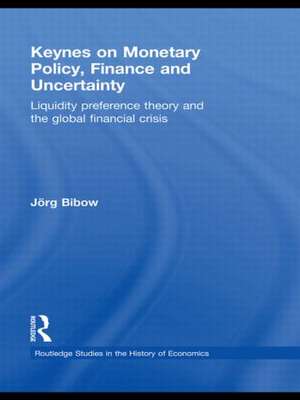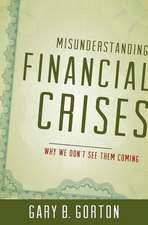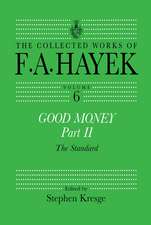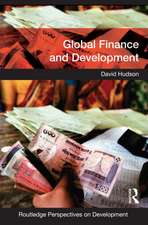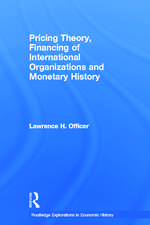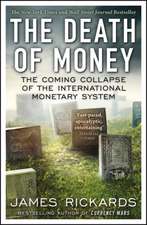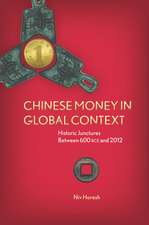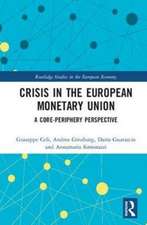Keynes on Monetary Policy, Finance and Uncertainty: Liquidity Preference Theory and the Global Financial Crisis: Routledge Studies in the History of Economics
Autor Jorg Bibowen Limba Engleză Paperback – 26 apr 2011
Jörg Bibow presents Keynes’ liquidity preference theory as a distinctive and highly relevant approach to monetary theory offering a conceptual framework of general applicability for explaining the role and functioning of the financial system. He argues that, in a dynamic context, liquidity preference theory may best be understood as a theory of financial intermediation. Through applications to current events and prominent hypotheses in global finance, this book underlines the richness, continued relevance, and superiority of Keynes’ theory of liquidity preference; with Hyman Minsky standing out for developing Keynes’ vision of financial capitalism.
| Toate formatele și edițiile | Preț | Express |
|---|---|---|
| Paperback (1) | 413.37 lei 6-8 săpt. | |
| Taylor & Francis – 26 apr 2011 | 413.37 lei 6-8 săpt. | |
| Hardback (1) | 1061.93 lei 6-8 săpt. | |
| Taylor & Francis – 29 iun 2009 | 1061.93 lei 6-8 săpt. |
Din seria Routledge Studies in the History of Economics
-
 Preț: 378.26 lei
Preț: 378.26 lei -
 Preț: 316.51 lei
Preț: 316.51 lei -
 Preț: 302.55 lei
Preț: 302.55 lei - 9%
 Preț: 1003.12 lei
Preț: 1003.12 lei -
 Preț: 324.46 lei
Preț: 324.46 lei -
 Preț: 311.28 lei
Preț: 311.28 lei -
 Preț: 326.99 lei
Preț: 326.99 lei -
 Preț: 326.82 lei
Preț: 326.82 lei -
 Preț: 665.69 lei
Preț: 665.69 lei - 9%
 Preț: 935.40 lei
Preț: 935.40 lei -
 Preț: 395.82 lei
Preț: 395.82 lei -
 Preț: 280.74 lei
Preț: 280.74 lei -
 Preț: 318.31 lei
Preț: 318.31 lei -
 Preț: 392.72 lei
Preț: 392.72 lei - 8%
 Preț: 392.82 lei
Preț: 392.82 lei -
 Preț: 310.43 lei
Preț: 310.43 lei -
 Preț: 214.15 lei
Preț: 214.15 lei -
 Preț: 399.71 lei
Preț: 399.71 lei -
 Preț: 157.37 lei
Preț: 157.37 lei - 26%
 Preț: 850.91 lei
Preț: 850.91 lei - 27%
 Preț: 995.39 lei
Preț: 995.39 lei - 18%
 Preț: 1005.04 lei
Preț: 1005.04 lei - 18%
 Preț: 1002.60 lei
Preț: 1002.60 lei - 28%
 Preț: 1046.46 lei
Preț: 1046.46 lei - 18%
 Preț: 1280.31 lei
Preț: 1280.31 lei - 18%
 Preț: 1055.51 lei
Preț: 1055.51 lei - 18%
 Preț: 1055.51 lei
Preț: 1055.51 lei - 28%
 Preț: 987.72 lei
Preț: 987.72 lei - 25%
 Preț: 824.17 lei
Preț: 824.17 lei - 18%
 Preț: 1061.93 lei
Preț: 1061.93 lei - 18%
 Preț: 716.32 lei
Preț: 716.32 lei - 18%
 Preț: 1006.07 lei
Preț: 1006.07 lei - 18%
 Preț: 1069.92 lei
Preț: 1069.92 lei - 12%
 Preț: 342.67 lei
Preț: 342.67 lei - 18%
 Preț: 1056.00 lei
Preț: 1056.00 lei - 28%
 Preț: 991.34 lei
Preț: 991.34 lei - 18%
 Preț: 1076.53 lei
Preț: 1076.53 lei - 18%
 Preț: 698.08 lei
Preț: 698.08 lei - 22%
 Preț: 332.02 lei
Preț: 332.02 lei - 18%
 Preț: 1169.78 lei
Preț: 1169.78 lei - 18%
 Preț: 1059.84 lei
Preț: 1059.84 lei - 30%
 Preț: 852.88 lei
Preț: 852.88 lei - 25%
 Preț: 830.10 lei
Preț: 830.10 lei - 18%
 Preț: 1119.93 lei
Preț: 1119.93 lei - 18%
 Preț: 1062.98 lei
Preț: 1062.98 lei - 18%
 Preț: 953.01 lei
Preț: 953.01 lei
Preț: 413.37 lei
Nou
Puncte Express: 620
Preț estimativ în valută:
79.09€ • 82.59$ • 65.32£
79.09€ • 82.59$ • 65.32£
Carte tipărită la comandă
Livrare economică 16-30 aprilie
Preluare comenzi: 021 569.72.76
Specificații
ISBN-13: 9780415616478
ISBN-10: 0415616476
Pagini: 262
Ilustrații: 9 b/w images and 9 line drawings
Dimensiuni: 156 x 234 x 23 mm
Greutate: 0.39 kg
Ediția:1
Editura: Taylor & Francis
Colecția Routledge
Seria Routledge Studies in the History of Economics
Locul publicării:Oxford, United Kingdom
ISBN-10: 0415616476
Pagini: 262
Ilustrații: 9 b/w images and 9 line drawings
Dimensiuni: 156 x 234 x 23 mm
Greutate: 0.39 kg
Ediția:1
Editura: Taylor & Francis
Colecția Routledge
Seria Routledge Studies in the History of Economics
Locul publicării:Oxford, United Kingdom
Public țintă
Postgraduate and ProfessionalCuprins
1. The triumph of Keynesianism? The role of liquidity preference theory in Keynes’ heresy 2. Some reflections on Keynes’ "finance motive" for the demand for money 3. The loanable funds fallacy: exercises in the analysis of disequilibrium 4. On Keynesian theories of liquidity preference 5. On exogenous money and bank behavior: The Pandora’s box kept shut in Keynes’ theory of liquidity preference? 6. Keynes on central banking and the structure of monetary policy 7. The international monetary order and global finance: Keynes’ vision and ideas 8. On what became of Keynes’ vision at Bretton Woods and some recent issues in global finance 9. Taking liquidity preference theory seriously
Notă biografică
Jorg Bibow is Associate Professor of Economics at Skidmore College, New York, USA and Research Associate at the Levy Economics Institute of Bard College, Annandale-on-Hudson, New York, USA
Recenzii
"Highly recommended."
M. G. Hayes, University of Cambridge, Journal of the History of Economic Thought (34:2) 2012
"I do not think anyone has exceeded, let alone matched, Bibow’s ability to think within Keynes’s own multi-dimensional, rich approach to economic theory and the provision of policies based upon it. …
The end result is a volume of profound scholarship and fundamental analysis of the workings of the modern interrelated capitalist world, emphasising especially the central role of Keynes’s liquidity preference theory of the rate of interest in theory and in the design of appropriate policies with which to tackle the fall out from the present crisis and its long-term aftermath."
Geoff Harcourt, University of Cambridge
"Over the years, Joerg Bibow has built a substantial reputation as a champion of Keynesian liquidity preference theory. This book brings together many of the papers on which this reputation is founded, together with applications to recent and ongoing events in global finance. The papers range from contributions on the history of economic ideas, through to economic history, contemporary monetary policy and recent travails in the banking sector. Lord Skidelsky, perhaps the most famous of Keynes's biographers, has recently written that 'We do not need a new Keynes; we do need the old Keynes, suitably updated'. This collection provides one of the best examples of what Skidelsky has in mind, an up-to-date body of analysis directed at contemporary issues that is not only Keynesian in name, but also reflects the spirit, analytical sophistication and appreciation of empirical data that can only come from a deep and intimate engagement with Keynes's work in economic theory, economic policy and as an investor."
Jochen Runde, Judge Business School, Cambridge University
"This is a book for the times. It revisits Keynes’s ideas on money, banking and monetary policy in a way which illuminates our understanding of the current crisis and how policy should address it. In particular, Bibow demonstrates the central role of liquidity preference, a cornerstone of Keynes’s theory which has been paid inadequate attention in the renewed focus on Keynesian fiscal policy. This is a scholarly contribution which directly addresses important policy issues in a compelling manner."
Sheila Dow, Emeritus Professor of Economics, University of Stirling
"This book on the relevance of Keynes's insights into the complex workings of finance and monetary policy, when uncertainty is taken seriously, is timely and very well done. The global financial crisis revealed the inadequacy of the mainstream 'New Consensus Macroeconomic' theoretical framework. In this very well written book, Joerg Bibow offers a clear exposition of a much richer Post-Keynesian alternative that applies liquidity preference theory to current events and prominent themes in global finance. The New Consensus Macroeconomics does not even address liquidity preference or money."Philip Arestis, Cambridge University
"Keynes on Monetary Policy, Finance and Uncertainty is a deep and lucid
resurrection of the theory of liquidity preference and its application to
the financial disasters of recent years. Joerg Bibow deftly explains what
has failed in today's central banks -- and it boils down to the fact that
the men in charge could never swim clear of the shipwreck of pre-Keynesian
monetary thought."
James K. Galbraith, University of Texas at Austin
M. G. Hayes, University of Cambridge, Journal of the History of Economic Thought (34:2) 2012
"I do not think anyone has exceeded, let alone matched, Bibow’s ability to think within Keynes’s own multi-dimensional, rich approach to economic theory and the provision of policies based upon it. …
The end result is a volume of profound scholarship and fundamental analysis of the workings of the modern interrelated capitalist world, emphasising especially the central role of Keynes’s liquidity preference theory of the rate of interest in theory and in the design of appropriate policies with which to tackle the fall out from the present crisis and its long-term aftermath."
Geoff Harcourt, University of Cambridge
"Over the years, Joerg Bibow has built a substantial reputation as a champion of Keynesian liquidity preference theory. This book brings together many of the papers on which this reputation is founded, together with applications to recent and ongoing events in global finance. The papers range from contributions on the history of economic ideas, through to economic history, contemporary monetary policy and recent travails in the banking sector. Lord Skidelsky, perhaps the most famous of Keynes's biographers, has recently written that 'We do not need a new Keynes; we do need the old Keynes, suitably updated'. This collection provides one of the best examples of what Skidelsky has in mind, an up-to-date body of analysis directed at contemporary issues that is not only Keynesian in name, but also reflects the spirit, analytical sophistication and appreciation of empirical data that can only come from a deep and intimate engagement with Keynes's work in economic theory, economic policy and as an investor."
Jochen Runde, Judge Business School, Cambridge University
"This is a book for the times. It revisits Keynes’s ideas on money, banking and monetary policy in a way which illuminates our understanding of the current crisis and how policy should address it. In particular, Bibow demonstrates the central role of liquidity preference, a cornerstone of Keynes’s theory which has been paid inadequate attention in the renewed focus on Keynesian fiscal policy. This is a scholarly contribution which directly addresses important policy issues in a compelling manner."
Sheila Dow, Emeritus Professor of Economics, University of Stirling
"This book on the relevance of Keynes's insights into the complex workings of finance and monetary policy, when uncertainty is taken seriously, is timely and very well done. The global financial crisis revealed the inadequacy of the mainstream 'New Consensus Macroeconomic' theoretical framework. In this very well written book, Joerg Bibow offers a clear exposition of a much richer Post-Keynesian alternative that applies liquidity preference theory to current events and prominent themes in global finance. The New Consensus Macroeconomics does not even address liquidity preference or money."Philip Arestis, Cambridge University
"Keynes on Monetary Policy, Finance and Uncertainty is a deep and lucid
resurrection of the theory of liquidity preference and its application to
the financial disasters of recent years. Joerg Bibow deftly explains what
has failed in today's central banks -- and it boils down to the fact that
the men in charge could never swim clear of the shipwreck of pre-Keynesian
monetary thought."
James K. Galbraith, University of Texas at Austin
Descriere
In this book, Jörg Bibow illustrates how Keynes' methodology inspired his economic theorizing and how this led to fundamental insights concerning the role of money that contrasted with orthodox closed-system modelling.
